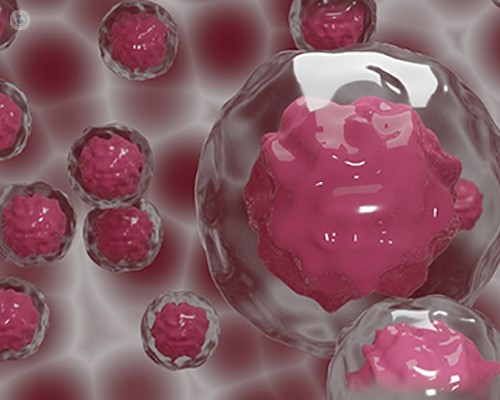Breakthroughs in advanced bladder cancer treatment
Escrito por:Discover the latest developments in advanced bladder cancer treatments, including new drugs and personalised approaches. Explore how these advancements are changing the way we manage advanced stages of the condition and what it means for patients. In his latest online article, Dr Mark Tuthill navigates through the practical aspects of these breakthroughs and their potential impact on bladder cancer treatment.

What are the latest advancements in advanced treatments for bladder cancer?
The latest advancements in treating bladder cancer can be categorised into two forms. The first involves the use of antibody drug conjugates, where chemotherapy is combined with antibodies. A notable example, approved for use in the UK as a second-line treatment, is enfortumab vedotin. This treatment demonstrates higher response rates compared to previous methods such as chemotherapy with paclitaxel, and it is associated with improved outcomes. A particularly exciting development, presented at last year's ESMO conference, involves the combination of enfortumab vedotin and pembrolizumab. When used as a first treatment, this combination shows exceptionally high response rates in patients with advanced bladder cancer. This approach appears to outperform the current cisplatin-based chemotherapy that was previously employed. This breakthrough has the potential to revolutionise the global approach to treating advanced bladder cancer, marking a significant and welcomed development in the field.
How effective are targeted therapies in managing advanced stages of bladder cancer?
When discussing targeted therapies, there are two distinct categories to consider. The first is immunotherapy, and a prominent medication in this realm for treating advanced urothelial carcinoma is a drug called avelumab. It is employed to sustain the initial benefits obtained from chemotherapy after the administration of first-line chemotherapy. Essentially, avelumab contributes to tumour control rates in approximately four out of every ten treated individuals, making it a deemed effective treatment.
We actively participated in the original research study conducted in Oxford, utilising this therapy initially in a research capacity and now as a standard of care. Other therapies, such as atezolizumab, are commonly utilised as initial and second-line treatments, particularly in patients with PD-L1 positive urothelial carcinoma.
However, the standout performer in this arena is enfortumab vedotin. This antibody treatment specifically targets a particular molecule on cancer cells, facilitating the direct delivery of chemotherapy to the tumour. In essence, targeted therapies are highly effective, comprising chemotherapy-focused targeted therapy and immunotherapy, both demonstrating a significant degree of effectiveness.
What are the potential side effects of immunotherapy for advanced bladder cancer?
Immunotherapy for advanced bladder cancer comes with associated side effects. By referring to information leaflets, such as those available on Cancer Research UK websites for drugs like atezolizumab, pembrolizumab, or avelumab, common themes regarding side effects can be observed. These side effects are primarily linked to the drugs' mechanisms, which involve enabling the immune system to target cancer cells by releasing certain inhibitory controls.
Common side effects of immune checkpoint inhibitors include fatigue, rash, diarrhoea, and joint aches. Additionally, there are other side effects, some of which are rare but severe, such as lung or heart inflammation, and others that are more common but less disabling, like hormone imbalances, such as alterations in thyroid function.
Patients transitioning from chemotherapy to immunotherapy often find the latter surprisingly well-tolerated. In summary, although there are various side effects, their management is usually feasible, and the overall tolerance of immunotherapy is generally favourable.
Can precision medicine or personalised therapies benefit individuals with advanced bladder cancer?
Currently, targeted therapies in bladder cancer are not widely employed. However, in the realm of precision medicine for bladder cancer, molecular testing is conducted to guide treatment decisions. This is particularly common for patients at a higher risk of recurrence after undergoing definitive surgery and prior chemotherapy.
One pivotal test in this context is PD-01 testing. If the tumour tests positive for PD-01, nivolumab can be administered post-cystectomy. Personalisation is incorporated into this approach, where a patient's PD-01 status is assessed. If PD-01 is high and other treatments are unsuitable, immunotherapies may be considered as initial treatments. Additionally, individuals with a significant family risk might undergo BRCA-1 or BRCA-2 testing, as there is evidence suggesting the efficacy of PARP inhibitors in urothelial carcinoma.
Despite the limited availability of targeted therapies in the clinic at present, a new drug named erdafitinib has emerged. Targeting abnormalities within the FGFR signalling pathway, erdafitinib has demonstrated superiority over chemotherapy for patients with metastatic urothelial carcinoma, provided they exhibit the relevant abnormality. Although precision medicine in bladder cancer is not as advanced as in other tumour types, there are promising molecular targeted therapies on the horizon. It is advisable to discuss these options with your oncologist during clinic visits to explore potential additional treatments alongside standard therapies.
Dr Mark Tuthill is an esteemed medical oncologist with more than 20 years of experience. You can schedule an appointment with Dr Tuthill on his Top Doctors profile.


